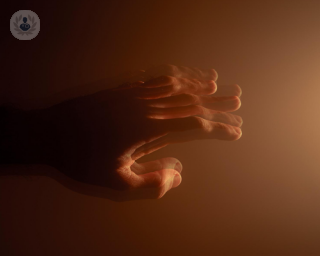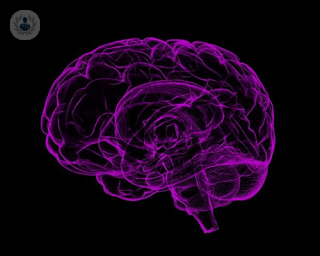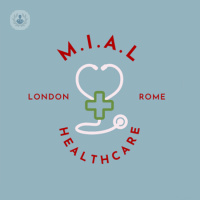What is Parkinsonism?
Parkinsonism is a general term that refers to a group of neurological disorders that cause movement problems similar to those seen in Parkinson's disease, such as tremors, slow movement and stiffness.
These neurological disorders are usually diagnosed and treated by a neurologist.

What are the symptoms of Parkinsonism?
The most common symptoms of this condition include:
- tremors, especially in the hands
- decreased facial expressions or difficulty making facial expressions
- paralysis or weakness of muscles
- difficulty controlling or initiating a movement
- muscle stiffness
- weakened voice
A person who has Parkinsonism will also often have another disorder that causes additional neurological symptoms. These symptoms may be dementia, confusion or memory loss, problems associated with balance and muscle spasms.
What are the causes of Parkinsonism?
Parkinson’s disease is the most common neurodegenerative cause of Parkinsonism.
Other causes of Parkinsonism include:
- brain injury
- encephalitis; inflammation of the brain, most commonly caused by a viral infection
- diffuse Lewy body dementia; a neurodegenerative disorder characterised by dementia
- HIV/AIDS
- multiple system atrophy (MSA), a fatal neurodegenerative disease causing slowness of movement and impaired speech, among other symptoms
- meningitis; inflammation of the membranes surrounding the brain and spinal cord can trigger symptoms of Parkinsonism
- stroke
- progressive supranuclear palsy; an uncommon brain disorder that affects movement, balance and speech.
- Wilson's disease; a disorder in which copper builds up in the body, causing tissue and organ damage
- carbon monoxide poisoning
- brain damage caused by anaesthetic drugs
- mercury poisoning and other chemicals
- certain medications used to treat mental disorders or nausea
- MPTP (a contaminant in some psychoactive drugs)
- narcotic overdose
Can Parkinsonism be prevented?
Parkinsonism can be prevented by treating the conditions causing Parkinsonism mentioned above or controlling the intake of medications that could potentially cause it.
What is the treatment for Parkinsonism?
If the cause of Parkinsonism is drug-related, the drug may be suspended or exchanged for another. Also, by treating conditions, such as infections or strokes that cause Parkinsonism, symptoms of the disease can be reduced or terminated. Drugs may be recommended to alleviate the symptoms of the disease, however, treatment always focuses more on the additional disease that a person has. Doctors often recommend physical and occupational therapy because they can help a person keep their muscles strong and improve balance.
12-20-2015 06-28-2023Parkinsonism
Professor Alastair Noyce - Neurology
Created on: 12-20-2015
Updated on: 06-28-2023
Edited by: Jay Staniland
What is Parkinsonism?
Parkinsonism is a general term that refers to a group of neurological disorders that cause movement problems similar to those seen in Parkinson's disease, such as tremors, slow movement and stiffness.
These neurological disorders are usually diagnosed and treated by a neurologist.

What are the symptoms of Parkinsonism?
The most common symptoms of this condition include:
- tremors, especially in the hands
- decreased facial expressions or difficulty making facial expressions
- paralysis or weakness of muscles
- difficulty controlling or initiating a movement
- muscle stiffness
- weakened voice
A person who has Parkinsonism will also often have another disorder that causes additional neurological symptoms. These symptoms may be dementia, confusion or memory loss, problems associated with balance and muscle spasms.
What are the causes of Parkinsonism?
Parkinson’s disease is the most common neurodegenerative cause of Parkinsonism.
Other causes of Parkinsonism include:
- brain injury
- encephalitis; inflammation of the brain, most commonly caused by a viral infection
- diffuse Lewy body dementia; a neurodegenerative disorder characterised by dementia
- HIV/AIDS
- multiple system atrophy (MSA), a fatal neurodegenerative disease causing slowness of movement and impaired speech, among other symptoms
- meningitis; inflammation of the membranes surrounding the brain and spinal cord can trigger symptoms of Parkinsonism
- stroke
- progressive supranuclear palsy; an uncommon brain disorder that affects movement, balance and speech.
- Wilson's disease; a disorder in which copper builds up in the body, causing tissue and organ damage
- carbon monoxide poisoning
- brain damage caused by anaesthetic drugs
- mercury poisoning and other chemicals
- certain medications used to treat mental disorders or nausea
- MPTP (a contaminant in some psychoactive drugs)
- narcotic overdose
Can Parkinsonism be prevented?
Parkinsonism can be prevented by treating the conditions causing Parkinsonism mentioned above or controlling the intake of medications that could potentially cause it.
What is the treatment for Parkinsonism?
If the cause of Parkinsonism is drug-related, the drug may be suspended or exchanged for another. Also, by treating conditions, such as infections or strokes that cause Parkinsonism, symptoms of the disease can be reduced or terminated. Drugs may be recommended to alleviate the symptoms of the disease, however, treatment always focuses more on the additional disease that a person has. Doctors often recommend physical and occupational therapy because they can help a person keep their muscles strong and improve balance.


Movement disorders: More than just Parkinson's
By Dr Vaclav Dostal
2024-12-22
Celebrities like Muhammad Ali, Ozzy Osbourne and Michael J. Fox have raised awareness of Parkinson's disease, and it's a commonly-known movement disorder. However, there are many more. Consultant neurologist Dr Daclav Dostal takes a detailed look at the different movement disorders in this informative article. See more


Parkinson's disease: dismantling the misconceptions
By Professor James Teo
2024-12-16
Parkinson's disease affects around 1 in 500 people in the UK. Owing to famous sufferers like Michael J Fox, who have sought to promote awareness and find a cure, the condition is part of the public consciousness. But here are 7 thighs that might surprise you.. See more
Experts in Parkinsonism
-
Dr Nikolay Dimitrov
NeurologyExpert in:
- Movement disorders
- Tremor
- Dystonia
- Restless legs syndrome
- Parkinson's disease
- Parkinsonism
-
Dr Martin Wilson
NeurologyExpert in:
- Multiple sclerosis
- Headache
- Neurological disorders
- Neurological treatments
- Parkinsonism
- Neuromyelitis optica
-
Professor Alastair Noyce
NeurologyExpert in:
- Parkinson's disease
- Parkinsonism
- Movement disorders
- Neurological disorders
- Tremor
- Headache
-
Dr Francesca Mastrolilli
NeurologyExpert in:
- Movement disorders
- Parkinson's disease
- Tremor
- Parkinsonism
- Headache
-
Professor Huw Morris
NeurologyExpert in:
- Neurological disorders
- Movement disorders
- Parkinson's disease
- Parkinsonism
- Headache
- Dizziness
- See all

MIAL Medici Italiani A Londra
MIAL Medici Italiani A Londra
9 Harley Street, London
No existe teléfono en el centro.
By using the telephone number provided by TOP DOCTORS, you automatically agree to let us use your phone number for statistical and commercial purposes. For further information, read our Privacy Policy
Top Doctors

HCA UK at The Shard
HCA UK at The Shard
32 St Thomas Street, SE1 9BS
No existe teléfono en el centro.
By using the telephone number provided by TOP DOCTORS, you automatically agree to let us use your phone number for statistical and commercial purposes. For further information, read our Privacy Policy
Top Doctors

Cleveland Clinic London Hospital
Cleveland Clinic London Hospital
33 Grosvenor Place
No existe teléfono en el centro.
By using the telephone number provided by TOP DOCTORS, you automatically agree to let us use your phone number for statistical and commercial purposes. For further information, read our Privacy Policy
Top Doctors
-
MIAL Medici Italiani A Londra
9 Harley Street, London , W1G Marylebone LondonExpert in:
- Cardiology
- Physiotherapy
- Internal medicine
- Neurology
- Otolaryngology
- Radiology
-
HCA UK at The Shard
32 St Thomas Street, SE1 9BS, Central LondonExpert in:
- Vascular Surgery
- Head and neck cancer
- Breast Cancer
- Orthopaedic surgery
- Thoracic Surgery
- Cancer screening clinic
-
Cleveland Clinic London Hospital
33 Grosvenor Place, Central LondonExpert in:
- Cardiology
- Colorectal surgery
- Minimal access surgery (keyhole surgery)
- Gallbladder surgery
- Diagnostic Imaging
- Ultrasound
- See all
- Most viewed diseases, medical tests, and treatments
- Narcolepsy
- Alzheimer's disease
- Cluster headaches
- Tension headache
- Chronic headache
- Peripheral nerve block
- Peripheral neuropathy
- Neuro-ophthalmology
- Migraine
- Tremor







